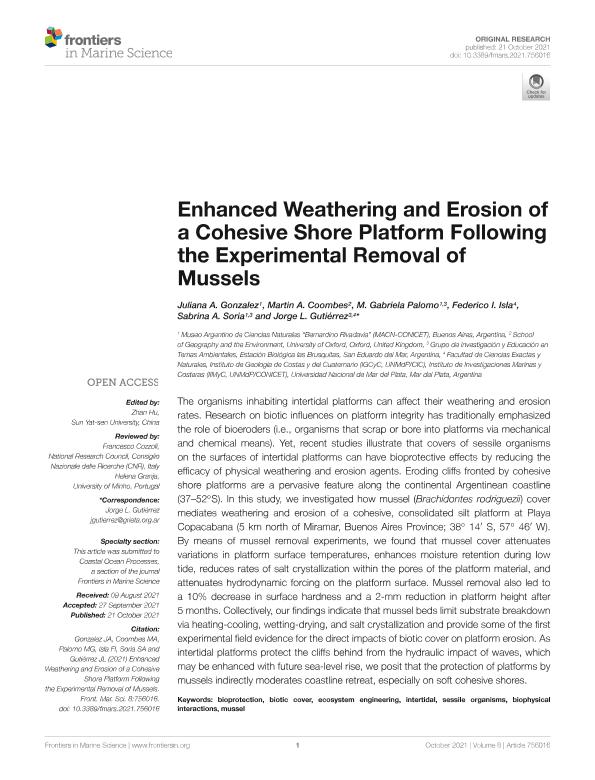Mostrar el registro sencillo del ítem
dc.contributor.author
Gonzalez, Juliana Andrea

dc.contributor.author
Coombes, Martin A.
dc.contributor.author
Palomo, Maria Gabriela

dc.contributor.author
Isla, Federico Ignacio

dc.contributor.author
Soria, Sabrina Andrea

dc.contributor.author
Gutierrez, Jorge Luis Ceferino

dc.date.available
2022-03-14T12:43:54Z
dc.date.issued
2021-10
dc.identifier.citation
Gonzalez, Juliana Andrea; Coombes, Martin A.; Palomo, Maria Gabriela; Isla, Federico Ignacio; Soria, Sabrina Andrea; et al.; Enhanced weathering and erosion of a cohesive shore platform following the experimental removal of mussels; Frontiers Media; Frontiers In Marine Science; 8; 10-2021; 1-13
dc.identifier.issn
2296-7745
dc.identifier.uri
http://hdl.handle.net/11336/153337
dc.description.abstract
The organisms inhabiting intertidal platforms can affect their weathering and erosion rates. Research on biotic influences on platform integrity has traditionally emphasized the role of bioeroders (i.e., organisms that scrap or bore into platforms via mechanical and chemical means). Yet, recent studies illustrate that covers of sessile organisms on the surfaces of intertidal platforms can have bioprotective effects by reducing the efficacy of physical weathering and erosion agents. Eroding cliffs fronted by cohesive shore platforms are a pervasive feature along the continental Argentinean coastline (37–52°S). In this study, we investigated how mussel (Brachidontes rodriguezii) cover mediates weathering and erosion of a cohesive, consolidated silt platform at Playa Copacabana (5 km north of Miramar, Buenos Aires Province; 38° 14′ S, 57° 46′ W). By means of mussel removal experiments, we found that mussel cover attenuates variations in platform surface temperatures, enhances moisture retention during low tide, reduces rates of salt crystallization within the pores of the platform material, and attenuates hydrodynamic forcing on the platform surface. Mussel removal also led to a 10% decrease in surface hardness and a 2-mm reduction in platform height after 5 months. Collectively, our findings indicate that mussel beds limit substrate breakdown via heating-cooling, wetting-drying, and salt crystallization and provide some of the first experimental field evidence for the direct impacts of biotic cover on platform erosion. As intertidal platforms protect the cliffs behind from the hydraulic impact of waves, which may be enhanced with future sea-level rise, we posit that the protection of platforms by mussels indirectly moderates coastline retreat, especially on soft cohesive shores.
dc.format
application/pdf
dc.language.iso
eng
dc.publisher
Frontiers Media

dc.rights
info:eu-repo/semantics/openAccess
dc.rights.uri
https://creativecommons.org/licenses/by-nc-sa/2.5/ar/
dc.subject
BIOPHYSICAL INTERACTIONS
dc.subject
BIOPROTECTION
dc.subject
BIOTIC COVER
dc.subject
ECOSYSTEM ENGINEERING
dc.subject
INTERTIDAL
dc.subject
MUSSEL
dc.subject
SESSILE ORGANISMS
dc.subject.classification
Ecología

dc.subject.classification
Ciencias Biológicas

dc.subject.classification
CIENCIAS NATURALES Y EXACTAS

dc.title
Enhanced weathering and erosion of a cohesive shore platform following the experimental removal of mussels
dc.type
info:eu-repo/semantics/article
dc.type
info:ar-repo/semantics/artículo
dc.type
info:eu-repo/semantics/publishedVersion
dc.date.updated
2022-03-02T15:49:21Z
dc.journal.volume
8
dc.journal.pagination
1-13
dc.journal.pais
Suiza

dc.description.fil
Fil: Gonzalez, Juliana Andrea. Consejo Nacional de Investigaciones Científicas y Técnicas. Oficina de Coordinación Administrativa Parque Centenario. Museo Argentino de Ciencias Naturales "Bernardino Rivadavia"; Argentina
dc.description.fil
Fil: Coombes, Martin A.. University of Oxford; Reino Unido
dc.description.fil
Fil: Palomo, Maria Gabriela. Consejo Nacional de Investigaciones Científicas y Técnicas. Oficina de Coordinación Administrativa Parque Centenario. Museo Argentino de Ciencias Naturales "Bernardino Rivadavia"; Argentina
dc.description.fil
Fil: Isla, Federico Ignacio. Consejo Nacional de Investigaciones Científicas y Técnicas. Centro Científico Tecnológico Conicet - Mar del Plata. Instituto de Investigaciones Marinas y Costeras. Universidad Nacional de Mar del Plata. Facultad de Ciencias Exactas y Naturales. Instituto de Investigaciones Marinas y Costeras; Argentina
dc.description.fil
Fil: Soria, Sabrina Andrea. Consejo Nacional de Investigaciones Científicas y Técnicas. Oficina de Coordinación Administrativa Parque Centenario. Museo Argentino de Ciencias Naturales "Bernardino Rivadavia"; Argentina
dc.description.fil
Fil: Gutierrez, Jorge Luis Ceferino. Consejo Nacional de Investigaciones Científicas y Técnicas. Centro Científico Tecnológico Conicet - Mar del Plata. Instituto de Investigaciones Marinas y Costeras. Universidad Nacional de Mar del Plata. Facultad de Ciencias Exactas y Naturales. Instituto de Investigaciones Marinas y Costeras; Argentina. Universidad Nacional de Mar del Plata. Facultad de Ciencias Exactas y Naturales. Departamento de Biología; Argentina
dc.journal.title
Frontiers In Marine Science

dc.relation.alternativeid
info:eu-repo/semantics/altIdentifier/doi/http://dx.doi.org/10.3389/fmars.2021.756016
dc.relation.alternativeid
info:eu-repo/semantics/altIdentifier/url/https://www.frontiersin.org/articles/10.3389/fmars.2021.756016/full
Archivos asociados
